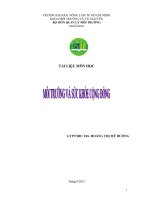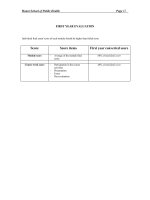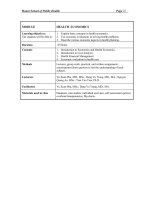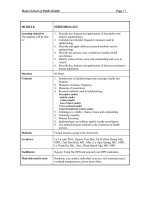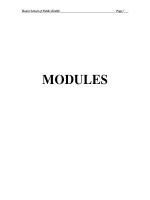vệ sinh môi trường và sức khỏe cộng đồng
Bạn đang xem bản rút gọn của tài liệu. Xem và tải ngay bản đầy đủ của tài liệu tại đây (195.76 KB, 10 trang )
Hanoi School of Public Health Page 57
• Crude 2x2 Tables
• Stratified Analysis:
(1) Rule out effect modification
(2) Assess confounding where appropriate
13. Write report.
Competency #3: TASK-BASED MANAGEMENT (Supervision and Logistics)
No. Contents Yes No
1. Works well as team member:
• Constructive and Cooperative Contribution to a Team
• Effective Team Leadership
• Personnel Supervision
(Note: The student is required to demonstrate an ability to work well as a team
member. Leadership and personnel supervision are encouraged but are optional
requirements for completion of the training program.)
2. Develop an individual work plan:
• Time Management (logistics)
• Financial Management (accounting)
• Other Resource Management (supplies, personnel, etc.)
3. Follow work plan to completion. (Flexibility may be necessary, but student
should demonstrate ability to accomplish primary tasks of work plan in a timely
fashion.)
Competency #4: ACTIVITY-BASED MANAGEMENT (Program Development / Policy)
No. Contents Yes No
1. Needs Assessment (e.g., key informant interviews and secondary data review)
2. Problem Identification and Priority Setting.
3. Strategic Planning:
• Set Objective
• Validate Objective (e.g., key informant interviews or focus group
discussions)
• Develop Action Plan (i.e., identify activities toward meeting objective)
4. Implementation Plan (i.e., feasible combination of action plan with available
time, personnel and financial resources)
5. Written Report or Memo of Recommended Implementation Plan to District
Office and Hanoi School of Public Health
Page 58 Master of Public Health Course
Competency #5: EFFECTIVE COMMUNICATIONS
No. Contents Yes No
1. Brief written abstracts, memo and reports. Please indicate which of the
following have been done and fill in the number completed below:
• Surveillance Evaluation Abstract
• Summary of Survey Findings
• Recommendations for Intervention
• Other (Please specify ________________________________)
# completed = ________
2. At least two complete study reports (e.g., scientific manuscripts, reports to
District Health Center or Hanoi School of Public Health, thesis).
3. At least three oral presentations of > 15 minutes each.
Competency #6: ADDITIONAL PUBLIC HEALTH APPLICATIONS
No. Contents Yes No
1. Outbreak or Disaster Investigation
2. Appropriate Use of Qualitative Methods:
• Key Informant Interviews
• Focus Group Discussions
• Social Marketing
- Identify appropriate target group(s)
- Determine method(s) of communicating message
- Develop health education materials
• Health Education / Promotion
3. Cost, Cost-Effectiveness and/or Cost-Benefit Analysis
Except as noted in Competency #3 (Task-based Management), all criteria for Competency #1 through
Competency #5 are required. The additional public health applications listed under Competency #6 are
generally considered optional at present, but key informant interviews and some sort of cost analysis are
expected as necessary components of Competency #4.
Hanoi School of Public Health Page 59
Checklist for supervision and process evaluation of
field activities
Phase I:
Checklist for supervision and process evaluation
Problem Identification and Study Design
No Items
Yes No
I Work plan for 4-month field activities*
1
II Choose Research topic
III Methodology of chosen topic
- Research topic chosen based on the results of exploratory research
- Research topic chosen based on the results of secondary data
IV
Characteristics of chosen topic
- Duplication with other research carried out before
- Feasibility
- Applicability
- Political Acceptability
- Urgency of data needed
- Ethical considerations
V Teamwork skills
• Discuss with local health center staff to identify priority problem(s) *
2
• Discuss with related local authority to identify priority problem(s)
• Discuss with team members on research topic and getting support from
local health center (3M) *
2
VI
Submission of study design on time
VII
Commitment of Health center for the sustainability of this topic
- Support on manpower
- Support on financial resources
- Material and facility resources
Chosen research topic:(write down)
........................................................................................................................................................................
........................................................................................................................................................................
........................................................................................................................................................................
........................................................................................................................................................................
*
1
Work plan for 4-month activities : Yes No
*
2
Final reports of group discussion (V): 1. Yes No
2. Yes No
3. Yes No
Remarks after supervision:
........................................................................................................................................
........................................................................................................................................
........................................................................................................................................
........................................................................................................................................
Page 60 Master of Public Health Course
Phase II:
Checklist for supervision and process evaluation
Technique and Process of Data Collection
No Items Yes No
1 Pretest the data collection tools
2 Pretest sampling procedures
3 What is the chosen sampling method of the research?
• Simple random sampling
• Systematic sampling
• Stratified sampling
• Cluster sampling
• Sampling for case-control study
• Convenience sampling
• Total sampling
• Others (specify)
4 Was the same sampling procedure used in the field as proposed in the study
design?
5 Sampling frame (for simple random, systematic and stratified sampling)
6 The list of sampling units chosen
7 Train the local health workers to help to collect data
8
Collect data with the above mentioned health workers, with ≥30% of the total
sampling to be done by the researcher.
Step 2: Monitor the data collection process by randomly chosen 1-2 fully completed
questionnaires and check the following issues in the field
The interviewee in the questionnaire is actually part of the sampling group
Has the individual been interviewed?
9
Is the gathered information credible?
10 The REC file is submitted on time
Constrains faced during process of collecting data and way to deal with
.....................................................................................................................................................................
.....................................................................................................................................................................
.....................................................................................................................................................................
.....................................................
Remarks after supervision:
........................................................................................................................................
........................................................................................................................................
........................................................................................................................................
........................................................................................................................................
........................................................................................................................................
........................................................................................................................................
Hanoi School of Public Health Page 61
Phase III:
Data processing and data analysis activities
These activities can be carried out in the field or in the school while taking in to account
the constrains faced during this periods that can prevent students complete their work on
time.
No Items Yes
No
1 Work plan for data processing
2 Work plan for data analysis
3 Number of questionnaire with missing data (MD) (Note if yes:
...............................................................................................)
4 Exclusion of questionnaire with too much missing data?
5 To make clear the contradictory differences in information collected in the
questionnaire if that were found?
6 Consider the impact due to exclusion the questionnaires with missing data
7 Sum up, and consider all the impact due to exclusion of questionnaires to
include in discussion part of the report
A. Data processing
1 Data processing
• manual
• computer
2 Data coding
• Manual
• Computer
• Coding of open-ended question
3 Data processing used computer
• Consult with computer expert right after setting up questionnaire
and dummy tables
• Editing of data using computer
• Software - what?
4 If use manual data processing
• Using of Data mater sheet-(DMS) to summarize data
• Do not use DMS to summarize data
• Manual sorting
• Tally counting
B.
Data analysis
1 Results related to the descriptive epidemiology
2 Contingency tables are appropriate to the research objectives and variables
3 Analyzing of qualitative data
4 Results are correct and appropriate to the statistical tests



